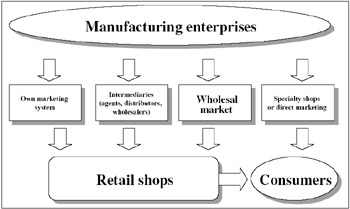Pricing practices
Most Chinese consumers are sensitive to price and will usually choose less expensive products. Price competition is the practice most frequently employed by enterprises to compete for market share. There have been 'price wars' on VCRs, microwave ovens, television sets and food products such as packaged milk. Many Chinese companies believe in the strategy of Bo Li Duo Xiao , which means low profit margin and volume sales. This belief has lead to a diverse range of pricing practices, including Shi Dian Li (10 per cent profit), ex- factory price, zero wholesale mark-up, etc. All of these tactics are based on the assumption that lower price will increase the speed of turnover and eventually generate high profit. This practice has led to vicious competition and culminated in the price of packaged milk in Shanghai being lower than the cost.
While low price strategy is widely adopted, some marketers use a high-price strategy, taking advantage of the conventional wisdom that Pian Yi Wu Hao Huo (cheap is no good) and Yi Fen Qian Yi Fen Huo (each additional cent paid is associated with additional value). This strategy is often associated with prestigious products or products that are intended to establish prestigious reputation. Foreign branded products or imported products are generally high-priced and perceived as superior products.
Other pricing strategies common to developed markets are also used by Chinese marketers including 'price lining ', 'skim-the-oil' pricing, 'odd-even' pricing, 'wasis' pricing, 'special event' pricing and so on. It is interesting to observe the unique characteristics of psychological pricing practices in China, which go beyond the simple odd-even considerations. Some Chinese people have a superstitious belief in lucky numbers. Marketers price their products in such a way that the numbers denote good luck. For example, a piece of furniture may be priced at 1199 to indicate Chang Chang Jiu Jiu (long and lasting ), or 4451 meaning Shi Shi Ru Yi (everything is as you wish). Other examples include: 518 ( Wo Yao Fa , meaning I will have a fortune ), 888 ( Fa Fa Fa, meaning fortune, fortune and fortune), 1688 ( Yi Lu Fa Fa “ endless fortune down the road), etc.

Figure 4.9.1: Typical marketing channels in China
EAN: 2147483647
Pages: 648